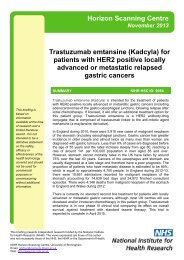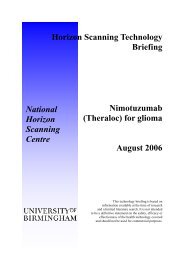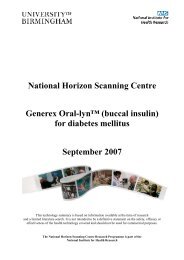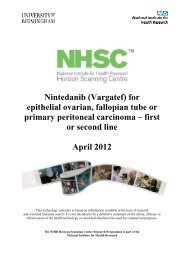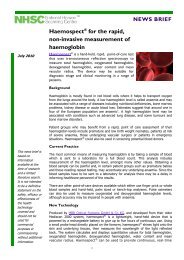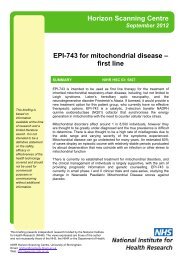Lenalidomide (Revlimid) for myelodysplastic syndrome - National ...
Lenalidomide (Revlimid) for myelodysplastic syndrome - National ...
Lenalidomide (Revlimid) for myelodysplastic syndrome - National ...
You also want an ePaper? Increase the reach of your titles
YUMPU automatically turns print PDFs into web optimized ePapers that Google loves.
<strong>Lenalidomide</strong> (<strong>Revlimid</strong>) <strong>for</strong><br />
<strong>myelodysplastic</strong> <strong>syndrome</strong><br />
August 2010<br />
This technology summary is based on in<strong>for</strong>mation available at the time of research<br />
and a limited literature search. It is not intended to be a definitive statement on the safety, efficacy or<br />
effectiveness of the health technology covered and should not be used <strong>for</strong> commercial purposes.<br />
The <strong>National</strong> Horizon Scanning Centre Research Programme is part of the<br />
<strong>National</strong> Institute <strong>for</strong> Health Research
August 2010<br />
<strong>Lenalidomide</strong> (<strong>Revlimid</strong>) <strong>for</strong> <strong>myelodysplastic</strong> <strong>syndrome</strong><br />
Target group<br />
• Myelodysplastic <strong>syndrome</strong> (MDS): low or intermediate-1 risk; associated with<br />
deletion 5q (del5q) cytogenetic abnormality; red blood cell (RBC) transfusion<br />
dependent – first line.<br />
Background<br />
MDS is a heterogeneous group of haematopoietic disorders, predominately affecting<br />
older individuals. It is characterised by hypercellular or hypocellular bone marrow with<br />
abnormal cell morphology, maturation and function, and peripheral blood cytopenias.<br />
MDS may be classified as primary (no known exposure) or secondary to complications<br />
from aggressive cancer treatments or other mutagenic agents, or evolve from other<br />
haematological clonal disorders (such as myeloproliferative disorders). It is caused by a<br />
cumulative acquisition of genetic errors in the bone marrow 1 . Common abnormalities<br />
include chromosomal deletions in 5q, 7, 20q, Y and trisomy 8. MDS is a premalignant<br />
condition progressing to acute myeloid leukaemia (AML) in a subgroup of patients if<br />
additional genetic abnormalities are acquired 2 . This occurs in approximately 30% of<br />
MDS patients 3 (less common in patients with the del5q abnormality than other <strong>for</strong>ms of<br />
MDS 4<br />
).<br />
Technology description<br />
<strong>Lenalidomide</strong> (<strong>Revlimid</strong>, CC-5013) is a structural analogue of thalidomide. It is an<br />
immunomodulatory drug that inhibits tumour necrosis factor-alpha and interleukin-1 beta<br />
and stimulates anti-inflammatory cytokine interleukin-10. <strong>Lenalidomide</strong> is in<br />
development <strong>for</strong> the treatment of patients with MDS associated with a del5q cytogenetic<br />
abnormality who are dependent on RBC transfusion. It is administered orally at 10mg<br />
once daily <strong>for</strong> 21 consecutive days of a 28 day cycle.<br />
<strong>Lenalidomide</strong> is licensed in the EU <strong>for</strong> the second line treatment of multiple myeloma in<br />
combination with dexamethasone. Common adverse events (>10%) reported include<br />
venous thromboembolism, neutropenia, fatigue, asthenia, constipation, muscle cramp,<br />
thrombocytopenia, anaemia, diarrhoea and rash 5<br />
.<br />
<strong>Lenalidomide</strong> in currently in development <strong>for</strong>:<br />
Phase III<br />
• Multiple myeloma; first line; newly diagnosed patients not eligible <strong>for</strong> autologous<br />
stem cell transplant.<br />
• Multiple myeloma: consolidation therapy post stem cell transplant.<br />
• Chronic lymphocytic leukaemia (CLL); first line; in older patients.<br />
• CLL; maintenance after second line therapy.<br />
• Diffuse large B-cell lymphoma.<br />
• Painful lumbar radiculopathy.<br />
Phase II<br />
• CLL; early stage; first line.<br />
• Acute myeloid leukaemia.<br />
• Cutaneous T-cell lymphoma; adjuvant therapy.<br />
• Mantle cell lymphoma; with rituximab or as monotherapy (IV <strong>for</strong>mulation).<br />
• Non-Hodgkin’s lymphoma; combination therapy or monotherapy.<br />
2
August 2010<br />
Innovation and/or advantages<br />
<strong>Lenalidomide</strong> is a new class of drug <strong>for</strong> the treatment of MDS associated with a del5q<br />
cytogenetic abnormality. If licensed, it may potentially offer improved RBC transfusion<br />
independence (TI) and quality of life.<br />
Developer<br />
Celgene Corporation.<br />
Availability, launch or marketing dates, and licensing plans<br />
<strong>Lenalidomide</strong> is a designated orphan drug <strong>for</strong> chronic lymphocytic leukaemia, multiple<br />
myeloma and MDS in the EU and USA.<br />
In phase III clinical trials.<br />
NHS or Government priority area<br />
This topic is relevant to the NHS Cancer Plan (2000) and Cancer Re<strong>for</strong>m Strategy (2007).<br />
Relevant guidance<br />
• NICE technology appraisal in development. Myelodysplastic <strong>syndrome</strong>s – azacitidine.<br />
Expected date of issue to be confirmed 6<br />
.<br />
• NICE cancer service guideline. Improving outcomes in haemato-oncology cancer.<br />
7<br />
2003 .<br />
• British Committee <strong>for</strong> Standardisation in Haematology. Guidelines <strong>for</strong> the diagnosis<br />
8<br />
and therapy of adult <strong>myelodysplastic</strong> <strong>syndrome</strong>s. 2003 .<br />
Clinical need and burden of disease<br />
The annual incidence of MDS is estimated at 4 per 100,000, but many cases remain<br />
undiagnosed 2 . This figure increases to 30 per 100,000 per year <strong>for</strong> patients over 70 years<br />
of age 8 . Around 2,000 people are diagnosed with MDS each year in the UK 9 . The<br />
deletion of chromosome 5q is one of the most common cytogenetic abnormalities in<br />
MDS, occurring in between 16% to 28% of patients 10 . In England, MDS (ICD-10: D46)<br />
resulted in 35,290 finished consultant episodes in 2008-09, and 97% of patients required<br />
admission 11 . Prognosis is based on the International Prognostic Scoring System (IPSS),<br />
which uses the percentage of blast cells, number of cytopenias and cytogenetics to<br />
calculate risk score. Multiple cytogenetic abnormalities are associated with a worse<br />
prognosis 12 . There are 4 risk groups which range from low to high with median survivals<br />
of 5.7 to 0.4 years respectively. In England and Wales, 963 people died due to an<br />
underlying cause of MDS in 2008, 867 (90%) of these patients were 70 years or older 13<br />
.<br />
Existing comparators and treatments<br />
Management of MDS is based on the patient’s IPSS score wherever possible 8 . Currently<br />
the only potentially curative treatment <strong>for</strong> MDS is haematopoietic stem cell<br />
transplantation, but this is only suitable in a small percentage of patients and where an<br />
adequate donor is available. The majority of treatment focuses on symptom relief:<br />
reducing cytopenias; treating persistent/recurring infection; improving quality of life<br />
(QoL); and prolonging survival. Many patients become transfusion dependent, so one<br />
major goal of treatment is to achieve TI, resulting in improved QoL and prolonged<br />
survival.<br />
The following drugs can be used to reduce or eliminate the transfusion need in specific<br />
subsets of MDS patients 3,8,14<br />
.<br />
• Erythropoietin (EPO, used in the majority of patients).<br />
3
August 2010<br />
• Darbopoetin.<br />
• Azacitidine 15<br />
(only used in advanced disease).<br />
• Decitabine (not licensed in UK).<br />
• Antithymocyte globulin (ATG, used in hypocellular MDS).<br />
• Cyclosporin.<br />
• Imatinib.<br />
Efficacy and safety<br />
Trial CC-5013-MDS-003, NCT00065156; CC-5013-MDS-003, NCT00074126;<br />
lenalidomide; phase II.<br />
lenalidomide; phase II extension.<br />
Sponsor Celgene Corporation. Memorial Sloan-Kettering Cancer Center.<br />
Status Trial complete and published. Trial complete and published in abstract 16 .<br />
Source of Trial registry<br />
in<strong>for</strong>mation<br />
16 , publication 10 and<br />
abstracts 17,18,19<br />
20<br />
Trial registry .<br />
.<br />
Location USA and Germany. USA.<br />
Design Single arm, open label. Single arm, open label.<br />
Participants n=148; adults; MDS; low or<br />
n=36; adults; MDS; low or intermediate-1<br />
and schedule intermediate-1 risk; associated del5q risk; associated del5q cytogenetic<br />
cytogenetic abnormality; RBC<br />
abnormality; RBC transfusion-dependent<br />
transfusion-dependent anaemia. anaemia; completed trial NCT00065156.<br />
<strong>Lenalidomide</strong> 10mg on days 1-21 of a <strong>Lenalidomide</strong> 10mg on days 1-21 of a 28<br />
28 day cycle or continuous dosing, <strong>for</strong><br />
up to 6 cycles.<br />
day cycle, <strong>for</strong> up to 6 cycles.<br />
Follow-up Treatment period up to 24 weeks (or<br />
continued until disease progression).<br />
-<br />
Primary<br />
outcome<br />
RBC TI a<br />
.<br />
RBC TI.<br />
Secondary Duration of TI; frequency of minor Safety.<br />
outcome erythroid; cytogenetic and pathological<br />
abnormalities; safety.<br />
Key results For both dosing schedules, at week 24<br />
TI was achieved by 99 patients (67%).<br />
Median time to TI 4.6 weeks.<br />
At median follow-up of 104 weeks,<br />
53/99 patients remained TI.<br />
-<br />
Expected<br />
reporting date<br />
- Not known.<br />
Adverse Neutropenia (55%) and<br />
-<br />
effects (AEs) thrombocytopenia (44%) were the most<br />
common AEs. 11 patients died whilst<br />
receiving treatment, 3 possibly<br />
treatment-related (neutropenic<br />
infection).<br />
Trial CC-5013-MDS-004, NCT00179621; CC-5013-MDS-007, NCT00812968;<br />
lenalidomide vs placebo; phase III. lenalidomide; phase II.<br />
Sponsor Celgene Corporation. Celgene Corporation.<br />
Status Trial ongoing. Published.<br />
Source of<br />
in<strong>for</strong>mation<br />
Trial registry 21<br />
.<br />
22 23<br />
Trial registry and publication .<br />
Location EU (inc UK) and Israel. Japan.<br />
a<br />
Transfusion independence (TI): defined as a period of at least 56 consecutive days during which no transfusions<br />
were given and the haemogloblin concentration increased by at least 1g/dL.<br />
4
August 2010<br />
Design Randomised, placebo-controlled. Single arm, open label.<br />
Participants<br />
and schedule<br />
n=162 (planned); adults; MDS; low or<br />
intermediate-1 risk; associated del5q<br />
cytogenetic abnormality; RBC<br />
transfusion-dependent anaemia.<br />
Randomised to lenalidomide 5mg every<br />
day, or lenalidomide 10mg on days 1-21<br />
of a 28 day cycle, or placebo, <strong>for</strong> 16<br />
weeks.<br />
Follow-up Initial treatment period 16 weeks, then<br />
further 52 weeks depending on disease<br />
progression. Open label treatment may<br />
continue <strong>for</strong> further 2 years. Total<br />
treatment period no greater than 3 years.<br />
Primary<br />
outcome<br />
Secondary<br />
outcome<br />
RBC TI <strong>for</strong> ≥26 weeks. Safety at 24 weeks.<br />
Erythroid response, duration of RBC TI,<br />
blood cell counts, bone marrow response,<br />
overall survival, time to AML<br />
trans<strong>for</strong>mation.<br />
n=11; adults; MDS; low or intermediate-1<br />
risk; associated del5q cytogenetic<br />
abnormality; RBC transfusion-dependent<br />
anaemia or symptomatic anaemia<br />
(haemoglobin [Hb]
August 2010<br />
Estimated cost and cost impact<br />
<strong>Lenalidomide</strong> is administered at a 10mg once daily dose <strong>for</strong> 21 consecutive days in a 28<br />
day cycle. The cost per cycle is there<strong>for</strong>e £3,780.<br />
Claimed or potential impact – speculative<br />
Patients<br />
Reduced mortality or increased<br />
length of survival<br />
Reduction in associated morbidity<br />
or Improved quality of life <strong>for</strong><br />
patients and/or carers<br />
Other: None identified<br />
Services<br />
Increased use<br />
Decreased use e.g. fewer<br />
admissions and shorter length of<br />
stay, reduced need <strong>for</strong><br />
transfusions.<br />
Costs<br />
Increased unit cost compared to<br />
alternative<br />
New costs:<br />
References<br />
Quicker, earlier or more accurate<br />
diagnosis or identification of<br />
disease<br />
Service organisation Staff requirements<br />
Other: None identified<br />
Increased costs: more patients<br />
coming <strong>for</strong> treatment<br />
Savings: reduction in hospital<br />
admissions due to reduced<br />
morbidity and need <strong>for</strong><br />
transfusions.<br />
Increased costs: capital<br />
investment needed<br />
Other:<br />
1 eMedicine. Myelodysplastic <strong>syndrome</strong>. http://emedicine.medscape.com/article/207347-overview Accessed 13<br />
July 2010.<br />
2 Killick SB. Myelodysplastic disorders. Medicine 2009;37:186-189.<br />
3 The Myelodysplastic Syndromes Foundation. Understanding <strong>myelodysplastic</strong> <strong>syndrome</strong>s: A patient handbook.<br />
http://www.mds-foundation.org/patientinfo.htm<br />
4<br />
eMedicine. Myelodysplastic <strong>syndrome</strong>s associated with isolated del(5q).<br />
http://emedicine.medscape.com/article/1644073-overview Accessed 13 July 2010.<br />
5<br />
Electronic Medicines Compendium (eMC). Summary of Product Characteristics (SPC) – <strong>Revlimid</strong>.<br />
http://www.medicines.org.uk<br />
6<br />
<strong>National</strong> Institute <strong>for</strong> Health and Clinical Excellence. Myelodysplastic <strong>syndrome</strong>s – azacitidine. Technology<br />
appraisal in development. Expected unknown.<br />
7 <strong>National</strong> Institute <strong>for</strong> Health and Clinical Excellence. Improving outcomes in haemato-oncology cancer. Cancer<br />
Service Guideline CSGHO. London: NICE;October 2003.<br />
8 Bowen D. Guidelines <strong>for</strong> the diagnosis and therapy of adult <strong>myelodysplastic</strong> <strong>syndrome</strong>s. British Journal of<br />
Haematology 2003;120:187-200.<br />
9 Leukaemia & Lymphoma Research. Myelodysplastic <strong>syndrome</strong>s. http://www.beatbloodcancers.org/patientin<strong>for</strong>mation/<strong>myelodysplastic</strong>-<strong>syndrome</strong>s-mds<br />
Accessed 14 July 2010.<br />
10 List A, Dewald G, Bennett J. <strong>Lenalidomide</strong> in the <strong>myelodysplastic</strong> <strong>syndrome</strong> with chromosome 5q deletion.<br />
The New England Journal of Medicine 2006;355:1456-1465.<br />
11 Health Episode Statistics (HES) Online. Primary diagnosis: 3 character 2008-09. www.hesonline.nhs.uk<br />
12 Patient UK. Myelodysplastic <strong>syndrome</strong>s (MDS). http://www.patient.co.uk/doctor/Myelodysplastic-<strong>syndrome</strong>s-<br />
(MDS).htm Accessed 13 July 2010.<br />
13 Office of <strong>National</strong> Statistics (ONS). Mortality statistics: deaths registered in 2008. www.statistics.gov.uk<br />
14 Schiffer CA. Myelodysplasia: The good, the fair and the ugly. Best Practice and Research Clinical<br />
Haematology 2007;20:49-55.<br />
15 Electronic Medicines Compendium (eMC). Summary of Product Characteristics (SPC) – Vidaza 25mg/ml<br />
powder <strong>for</strong> suspension <strong>for</strong> injection. http://www.medicines.org.uk<br />
16 ClinicalTrials.gov. <strong>Lenalidomide</strong> safety/efficacy in myedysplastic <strong>syndrome</strong>s (MDS) associated with a<br />
deletion 5q cytogenetic abnormality. http://www.clinicaltrials.gov/ct2/show/study/NCT00065156 Accessed 09<br />
July 2010.<br />
6
August 2010<br />
17 List AF, Dewald G, Bennett J et al. Hematologic and cytogenic (CTG) response to lenalidomide (CC-5013) in<br />
patients with transfusion-dependent (TD) <strong>myelodysplastic</strong> <strong>syndrome</strong> (MDS) and chromosome 5q31.1 deletion:<br />
results of the multicenter MDS-003 study. Journal of Clinical Oncology 2005;23(16 Suppl):5.<br />
18 List AF, Moffitt L, Gewald G et al. Results of the MDS-002 and -003 international phase II studies evaluating<br />
lenalidomide (CC-5013; <strong>Revlimid</strong>) in the treatment of transfusion-dependent (TD) patients with<br />
myelodysplasia <strong>syndrome</strong> (MDS). European Hematology Association (EHA) Conference June 2005; Abs<br />
0772.<br />
19 List A, Moffitt HL, Dewald G et al. Clinical benefit from 2 phase II trials evaluating lenalidomide (revlimid)<br />
in lower-risk <strong>myelodysplastic</strong> <strong>syndrome</strong> patients with or without del 5q cytogenetic abnormalities. European<br />
Hematology Association (EHA) Conference June 2006; Abs 1032.<br />
20 ClinicalTrials.gov. CC-5013 in treating patients with red blood cell transfusion-dependent <strong>myelodysplastic</strong><br />
<strong>syndrome</strong>s and cytogenetic abnormality. http://www.clinicaltrials.gov/ct2/show/NCT00074126 Accessed 09<br />
June 2010.<br />
21 ClinicalTrials.gov. <strong>Lenalidomide</strong> versus placebo in <strong>myelodysplastic</strong> <strong>syndrome</strong>s with a deletion 5qabnormality.<br />
http://www.clinicaltrials.gov/ct2/show/NCT00179621 Accessed 09 June 2010.<br />
22 ClinicalTrials.gov. Study of CC-5013 to evaluate safety, pharmokinetics and effectiveness <strong>for</strong> Japanese<br />
patients with symptomatic anaemia associated with <strong>myelodysplastic</strong> <strong>syndrome</strong> with a del(5)(q31-33)<br />
abnormality. http://www.clinicaltrials.gov/ct2/show/NCT00812968 Accessed 09 June 2010.<br />
23 Harada H, Watanabe M, Suzuki K et al. <strong>Lenalidomide</strong> is active in Japanese patients with symptomatic<br />
anaemia in low- or intermediate-1 risk <strong>myelodysplastic</strong> <strong>syndrome</strong>s with a deletion 5q abnormality.<br />
International Journal of Haematology 2009;90:353-360.<br />
24 ClinicalTrials.gov. The efficacy and safety of lenalidomide monotherapy in red blood cell transfusion<br />
dependent subjects with <strong>myelodysplastic</strong> <strong>syndrome</strong> (MDS) associated with del (5q) abnormality.<br />
http://www.clinicaltrials.gov/ct2/show/NCT00874978 Accessed 09 June 2010.<br />
25 ClinicalTrials.gov. Safety of lenalidomide and markers <strong>for</strong> disease progression in patients with international<br />
prognostic scoring system (IPSS) low- or intermediate-1 risk <strong>myelodysplastic</strong> <strong>syndrome</strong>s (MDS) with isolated<br />
del5q (MDS-LE-MON-5). http://www.clinicaltrials.gov/ct2/show/NCT01081431 Accessed 09 June 2010.<br />
The <strong>National</strong> Institute <strong>for</strong> Health Research <strong>National</strong> Horizon Scanning Centre Research<br />
Programme is funded by the Department of Health.<br />
The views expressed in this publication are not necessarily those of the NHS, the NIHR or the<br />
Department of Health<br />
The <strong>National</strong> Horizon Scanning Centre,<br />
Department of Public Health and Epidemiology<br />
University of Birmingham, 90 Vincent Drive, Edgbaston, Birmingham, B15 2SP, England<br />
Tel: +44 (0)121 414 7831 Fax +44 (0)121 414 2269<br />
www.haps.bham.ac.uk/publichealth/horizon<br />
7



